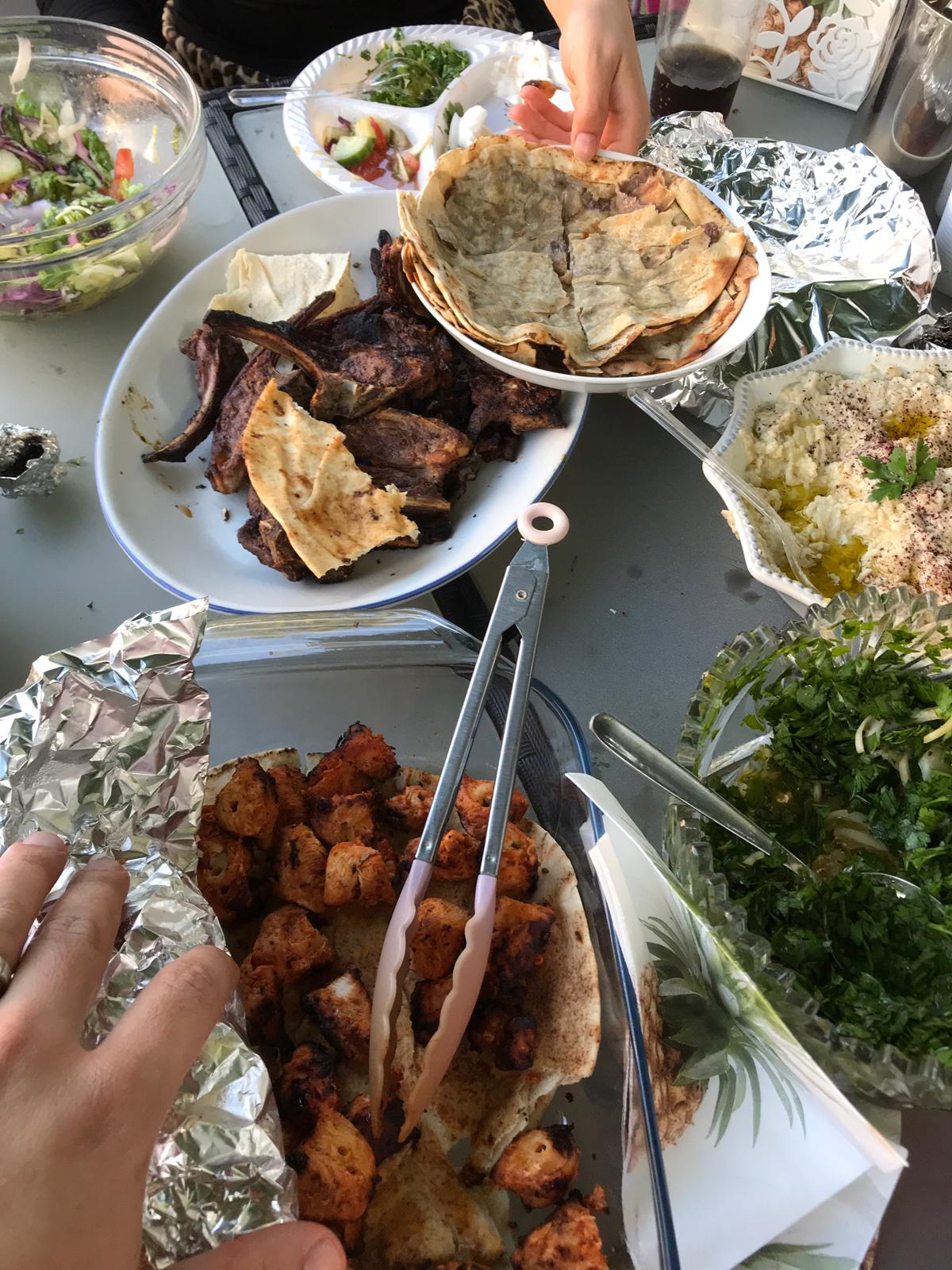العربة فارغة الآن
Why is Middle Eastern food so delicious?
Middle Eastern cuisine, with its diverse and exquisite flavors, has won the hearts of food enthusiasts across the globe. From the savory falafel to the sweet baklava, every dish tells a story, encapsulating centuries of tradition, culture, and innovation. In this article, we'll delve deep into the heart of Middle Eastern cuisine to uncover the reasons behind its unparalleled deliciousness.
1. The Deep Roots of Cultural Heritage
A Journey through Time: Middle Eastern cuisine is not just a culmination of ingredients but a tapestry woven with threads of history. With influences ranging from the Persian, Ottoman to Arab legacies, every bite offers a hint of the past. It's a cuisine that has seamlessly incorporated various cultures, which is evident in its wide range of dishes and flavors1.
Tradition meets Innovation: While Middle Eastern dishes uphold traditions, they're never resistant to innovation. This duality ensures that the cuisine remains relevant, vibrant, and ever-evolving.
2. The Bounty of Fresh Ingredients
A Celebration of Nature: At the heart of Middle Eastern cuisine lies its commitment to fresh, high-quality ingredients. Whether it's the herbs used in salads or the spices that elevate the flavors of a dish, freshness is paramount. By relying on ingredients that are in-season and locally-sourced, Middle Eastern dishes achieve an authenticity and depth of flavor that's hard to replicate1.
More than Just Food: These ingredients are not just about taste. They're symbols of the region's rich agricultural heritage. For instance, the olive oils used aren't just any oils; they're often sourced from ancient groves, carrying with them the essence of the very land they come from.

3. An Intricate Fusion of Flavors
The Art of Balancing Flavors: Middle Eastern dishes are a masterclass in flavor balancing. The cuisine seamlessly merges sweet with savory, creating a palatable dance of tastes in the mouth. Consider the tahini sauce, with its rich, nutty profile, perfectly complementing the zesty punch of falafel.
Spice is the Essence of Life: Middle Eastern food isn't shy about its use of spices. But it's not about overpowering the palate; it's about enhancing the natural flavors of the ingredients. The herbs and spices used, whether it's the fragrant sumac or the earthy cumin, are carefully chosen to complement, not overshadow.

4. The Health Benefits of Middle Eastern Cuisine
Wholesome and Nutritious: Middle Eastern cuisine isn't just about tantalizing your taste buds; it's also about nourishing your body. Many of the ingredients, from fruit and veggies to nuts and legumes, are packed with vitamins, minerals, and antioxidants. This ensures that while you indulge in the delightful flavors, you're also feeding your body with essential nutrients.
Healthy Fats: The cuisine leans heavily on olive oil, a known source of heart-healthy monounsaturated fats. Additionally, dishes like hummus, made with tahini, provide beneficial fatty acids that are good for overall health. The use of nuts such as walnuts, almonds, and pistachios further enhances the health quotient of many recipes.
Lower Meat Consumption: Middle Eastern meals often spotlight plant-based dishes. Lentils, chickpeas, and a variety of beans take center stage, providing ample protein without the saturated fats associated with red meat. This isn't to say meat is absent—meat dishes are savored, but they are typically balanced with a plethora of vegetable-based accompaniments.
5. Bread - The Quintessential Staple
Diversity in Every Bite: Bread, an essential component of Middle Eastern cuisine, comes in various forms. From the soft pita pockets to the crispy lavash, the bread and home baking section of a Middle Eastern kitchen is a testament to the region's rich culinary diversity.
More Than Just an Accompaniment: Bread isn't just a side dish. It's a tool, a utensil, and sometimes even the star of the show. Think of dishes like Manakish, where the bread is topped with a mixture of za'atar and olive oil, or Fatayer, stuffed pies filled with spinach, cheese, or meat.

6. Beverages - Quenching Thirst with Tradition
A Drink for Every Occasion: Middle Eastern beverages are as diverse as the food. From the aromatic Turkish coffee to the refreshing mint tea, there's a drink for every mood. Additionally, beverages like Ayran, a yogurt-based drink, not only quench thirst but also offer probiotic benefits.
A Symbol of Hospitality: Serving a drink, be it tea or coffee, is more than a simple gesture—it's a symbol of hospitality, an intrinsic part of Middle Eastern culture. Whether you're a guest or just stopping by a market, you'll often find yourself greeted with a comforting cup of warmth.

7. Approachable Cooking and The Joy of Sharing
Easy-to-Follow Recipes: What makes Middle Eastern cuisine even more endearing is its approachability. Even for someone unfamiliar with the cuisine, many recipes are straightforward and easy to follow. Whether it's whipping up a quick tahini sauce or assembling a flavorful shawarma wrap, the steps are simple, and the results, invariably delicious.
Food Bloggers Paving the Way: With the rise of digital media, numerous food bloggers, like Heifa Odeh, have played a significant role in making Middle Eastern cooking more approachable. They provide a treasure trove of classic Arabic dishes with a contemporary twist, all while preserving the traditional essence passed down by generations. By sharing their family recipes, techniques, and stories, they've brought the joys of Middle Eastern cooking to kitchens worldwide.
8. Sweet Endings - Middle Eastern Desserts
A Perfect Conclusion: No meal in the Middle East is complete without a sweet ending. Desserts, often infused with nuts and drizzled with syrup or honey, are a fitting finale to the symphony of flavors experienced during a meal.
Popular Delights: Delicacies like baklava, filled with crushed nuts and sweetened with rose or orange blossom water, or kunafa, a dessert made from thin noodle-like pastry soaked in sweet sugar-based syrup, showcase the richness and diversity of the region's confectioneries.

9. The Community Aspect - Food as a Binding Force
Food Beyond the Plate: Middle Eastern food is not just about individual consumption; it's a communal experience. Meals are often shared, with large platters placed at the center of the table, allowing everyone to partake. This style of dining not only fosters a sense of community but also turns every meal into a celebratory gathering.
Festive Delicacies: Many dishes, especially sweets like Patchi chocolates or date-filled maamoul cookies, are associated with particular festivities or celebrations. These traditions have been preserved and passed down, making the food an integral part of cultural and familial celebrations.
In Conclusion: A Culinary Journey Like No Other
Middle Eastern cuisine is a confluence of history, culture, innovation, and tradition. From its deep-rooted historical influences to its dedication to fresh ingredients, its health benefits, and the communal joy of sharing a meal, it offers an unmatched culinary experience. And for those in the UK longing for an authentic taste of the Middle East, 24Shopping delivers a range of Middle Eastern groceries right to your doorstep, ensuring that you can embark on this flavorful journey from the comfort of your home.
As you relish the myriad flavors of this cuisine, remember the stories, traditions, and centuries of evolution that each dish carries with it. Here's to the timeless appeal of Middle Eastern food – a true testament to the region's rich heritage and the universal language of good food.



